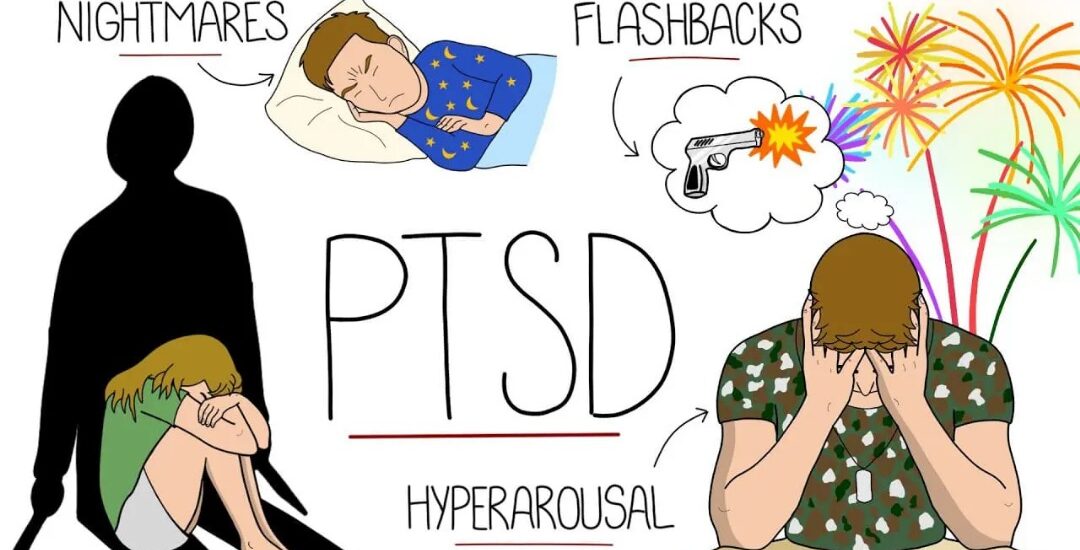Presented by Dr. Daniel Acquah, Ankaful Psychiatric Hospital
Introduction
Post-Traumatic Stress Disorder (PTSD) is a psychiatric disorder that occurs in individuals who have experienced or witnessed a traumatic event. These events can include natural disasters, serious accidents, terrorist acts, war and combat, rape or other violent personal assaults. PTSD is characterized by intense, disturbing thoughts and feelings related to their experience that last long after the traumatic event has ended. The person may relive the event through flashbacks or nightmares, feel sadness, fear, or anger, and may feel detached or estranged from other people.
What is PTSD?
Post-Traumatic Stress Disorder (PTSD) is a serious mental health condition that some people develop after experiencing or witnessing a life-threatening event. While it is normal to feel afraid during and after a traumatic situation, most people recover naturally over time. However, individuals with PTSD continue to experience severe stress reactions long after the danger has passed.
Symptoms may develop soon after the event or may appear years later. The symptoms must last more than a month and be severe enough to interfere with daily life to be diagnosed as PTSD.
Who Can Get PTSD?
Anyone who has experienced a life-threatening or highly traumatic event can develop PTSD. However, not everyone who experiences trauma will develop PTSD. Factors that can increase the likelihood of developing PTSD include:
- The intensity and duration of the trauma
- The individual’s proximity to the traumatic event
- Previous history of trauma or mental health conditions
- Lack of social support after the trauma
- Additional stress after the event, such as loss of a loved one, injury, or job loss
Women are twice as likely as men to develop PTSD.
Symptoms of PTSD
PTSD symptoms are grouped into four categories:
1. Intrusive Thoughts
- Recurrent, involuntary, and distressing memories of the traumatic event
- Flashbacks, where the individual relives the trauma as if it were happening again
- Nightmares or distressing dreams related to the traumatic event
2. Avoidance
- Avoiding thoughts, feelings, or conversations about the traumatic event
- Staying away from places, people, or activities that remind the individual of the trauma
3. Negative Changes in Thinking and Mood
- Persistent negative thoughts about oneself or the world
- Distorted feelings of guilt or blame
- Loss of interest in activities once enjoyed
- Difficulty remembering details of the traumatic event
4. Arousal and Reactivity Symptoms
- Being easily startled or feeling “on edge”
- Difficulty sleeping or frequent nightmares
- Outbursts of anger or irritability
- Trouble concentrating
How is PTSD Diagnosed?
PTSD is diagnosed by a mental health professional through a clinical assessment. The symptoms must:
- Persist for more than a month
- Cause significant distress or interfere with daily functioning
- Not be due to medication, substance use, or another medical condition
Treatment of PTSD
PTSD is treatable, and early intervention can improve recovery outcomes. Treatment options include:
1. Psychotherapy
- Trauma-Focused Cognitive Behavioral Therapy (TF-CBT): A structured approach that helps patients reframe distressing thoughts related to the trauma.
- Eye Movement Desensitization and Reprocessing (EMDR): A specialized therapy that uses guided eye movements to help process and reframe traumatic memories.
- Prolonged Exposure Therapy: A type of therapy that gradually exposes the patient to trauma-related thoughts and situations to reduce avoidance.
2. Medication
- Selective Serotonin Reuptake Inhibitors (SSRIs): Antidepressants such as Sertraline and Paroxetine are commonly used to treat PTSD.
- Prazosin: A medication that has been found to help reduce PTSD-related nightmares.
3. Lifestyle and Supportive Care
- Engaging in regular physical activity and stress-reducing activities like yoga or meditation
- Seeking support from family, friends, or support groups
- Avoiding alcohol and drug use, which can worsen symptoms
Breaking the Silence on PTSD
PTSD is a serious condition, but help is available. The longer it goes untreated, the more severe its effects can be on a person’s life. Seeking professional help is crucial for recovery.
At Ankaful Psychiatric Hospital, we are dedicated to providing expert mental health care and raising awareness about PTSD. If you or someone you know is experiencing PTSD symptoms, do not hesitate to seek professional support.
Visit Ankaful Psychiatric Hospital for expert mental health care.
#MentalHealthAwareness #PTSD #Mental Health, Total Health #AnkafulPsychiatricHospital


